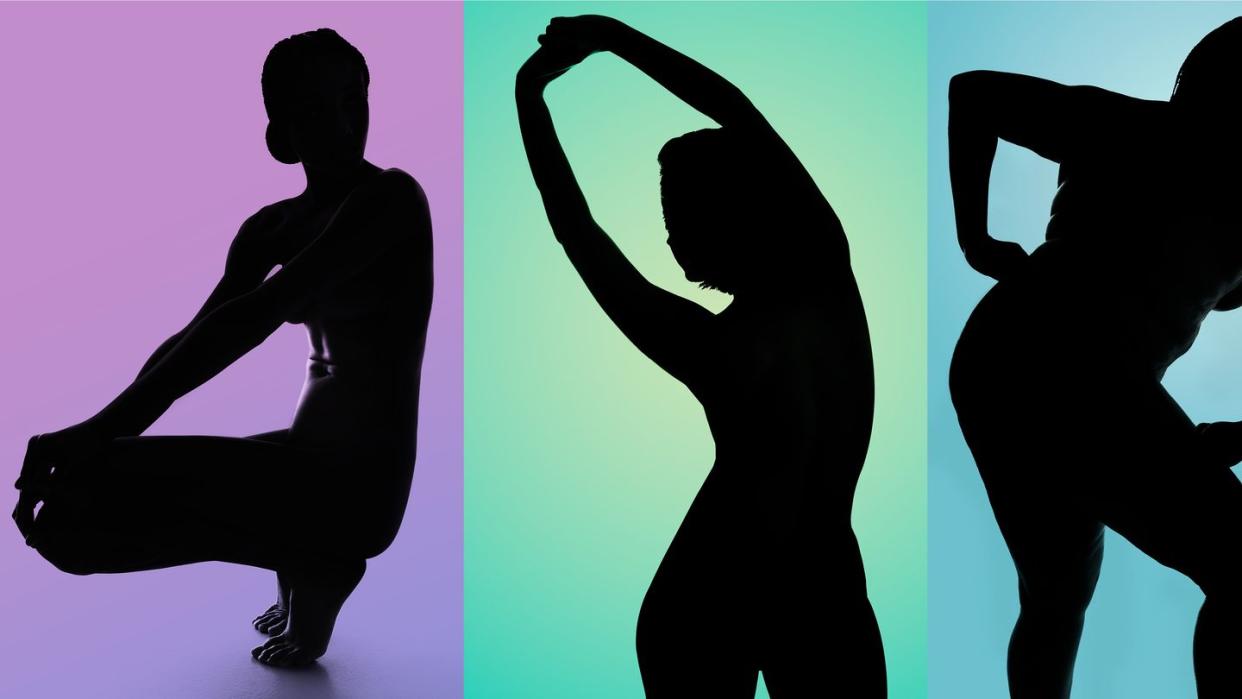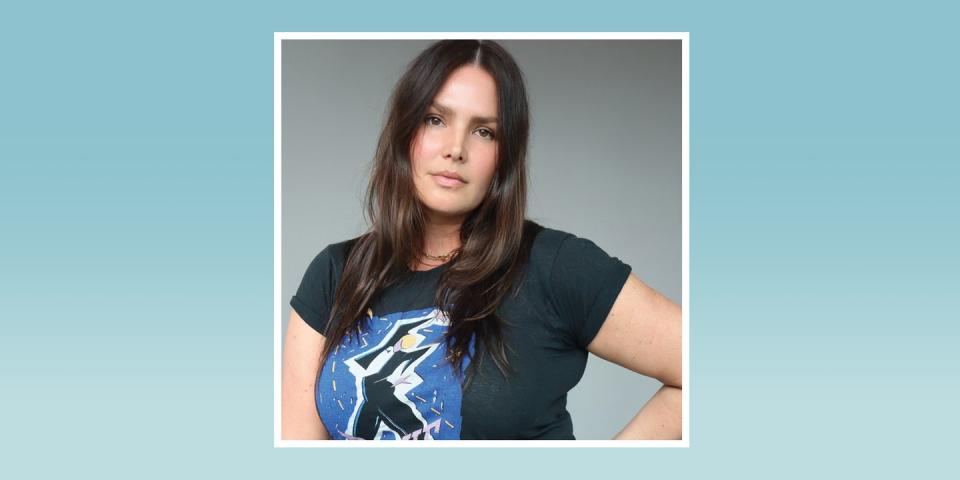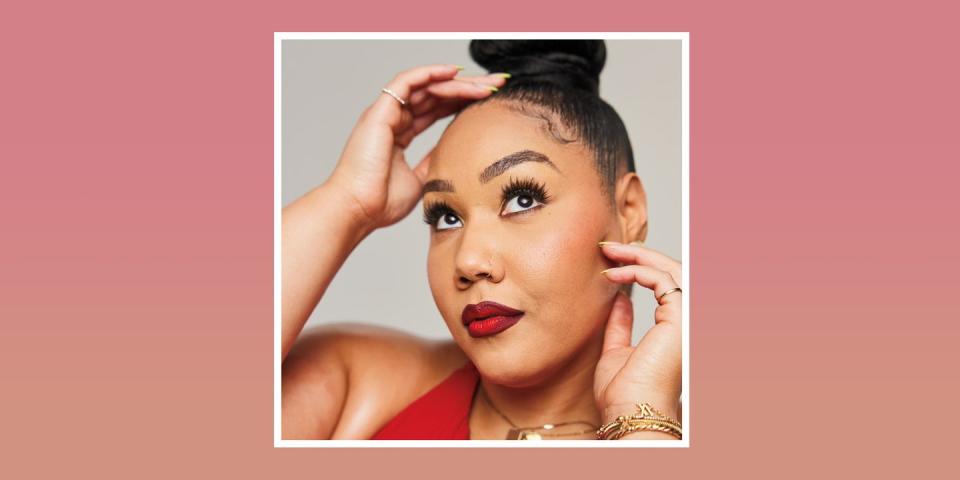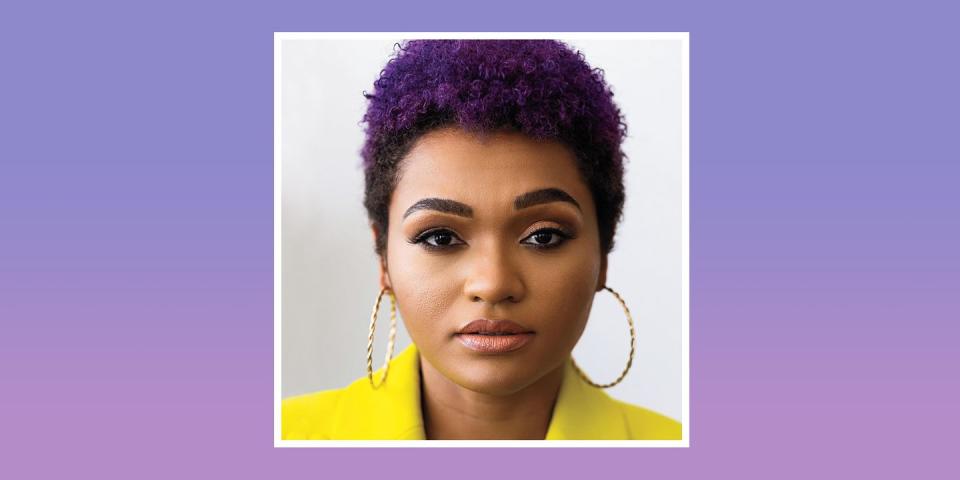How Do You Talk About Your Body? It May Change The Way You See It


In a Women’s Health poll of more than 1,000 Instagram followers, 82% of respondents said they think about their own body image every. single. day.
It’s like the song we can’t get out of our head, whether we like it or not. And when poll respondents were asked the one word they would use to describe their body, their harmonizing chorus of strong and beautiful and healthy rang clear, but the competing strains of fat and overweight and weak provided a counterpoint.
Reality check: We have work to do when it comes to how we talk about ourselves. (It’s no secret that our inner voice can be particularly critical!)
As for the body image content you find most interesting, we were heartened to hear that 39 percent of you are looking for expert advice and tips to help with a course change. (Close behind was “real-women stories” at 38 percent.) These are the glimmers of goodness—and areas of opportunity and growth—WH is here to share and explore with you.
WH asked… At what point did you feel most comfortable in your body? 32% of you said no. 32% of you said 5 years ago. 36% of you said 10 years ago.
Candice Huffine on tuning in to her body and saying no to Ozempic

Ash Pryor on smashing stereotypes as a Peloton instructor

Lolo Spencer on building confidence and community

How to Change Your Inner Monologue
If you were brought up with parents who ragged on their bodies (or yours), or if you have ever matched a friend’s “I hate my arms” with “Ew, look at my stomach”—or ragged on yourself for whatever reason—then you’re well versed in the kinds of insults that can course through your mind. They’re intrusive, damaging, and—eff!—hard to get rid of. When you have to unpack a lifetime of these messages, undoing the damage can feel like a no-go zone. “It’s possible, but it takes work,” says Jennifer Harriger, PhD, a professor of psychology at Pepperdine University.
That exploration, though, is worth it. Not only is a positive body image linked to better mental health (reduced depression and higher self-esteem), according to research, but studies also find that body image is related to your ability to take care of your own health, such as a willingness to go to the doctor, moderate your alcohol intake, and wear sunscreen. The truth is, when concerns about your body and appearance come first, you often end up putting yourself second. Reframing how you talk to yourself is doable, and it can be fun in a protect-your-peace type of way. Flip the script with these expert strategies.

Sideline Some Socials
Body positivity, which entails loving yourself for how you look, is wonderful. But TikTok makes it seem as if body positivity belongs to one type of person, research in Body Image finds. Women in these video posts tend to be white, between ages 15 and 20, and have Western-based beauty ideals. Social media also starts the comparison game, even if influencers are talking about how much they embrace their “flaws.” The intent is good, but it may not land well with you. Check in with yourself, Harriger says. What makes you feel good? What makes you feel bad? Unfollow or mute accounts that bring any negativity.
Recalibration: “After I had a baby, my body shape just changed.”
“It was hard seeing my weight fluctuate in a short period of time during and after pregnancy. Because I was plus-size, one issue I faced was ‘not looking pregnant enough’ and just looking bigger. When you are in a place where you are comfortable with your body and suddenly your clothes feel very different, it’s an adjustment. I had to shift my mindset from Oh, this is different and I don’t like it to How can I find confidence with this difference? One of the best things I did was to speak positively about myself. If my clothes don’t fit, I remind myself that they are just clothes! I also put my energy toward habits that are good for my mental and physical health, such as eating a balanced diet and taking time every day to walk with my daughter in the stroller. For me, wellness isn’t about trying to change my body, it’s about how I feel.” —Adelia Killian, 27, content creator in Cincinnati
Get Angry About It
If you’ve grown up with messages that your body isn’t good enough, there’s a reason for that. “It keeps us second in line,” says Virginia Ramseyer Winter, PhD, director of the Center for Body Image Research and Policy at the University of Missouri at Columbia. “Confident women disrupt the status quo, and when we’re not distracted by appearance, we can put time and energy into things that truly matter to us,” she says. Next time you’re having a bad body day, ask yourself who that serves. It sure as heck isn’t you.
Talk Body Diversity
If you’re a parent or a proud aunt, whether the kids are girls or boys, be vocal about embracing all body types, says Ramseyer Winter. You can say things like, “All bodies have value” or “Body diversity is a good thing” if they ask about someone’s size or if it comes up on a TV show, YouTube, or social media. Not only does that help shift their POV, but it can move yours too.

Ask Yourself, “What Can My Body Do?”
Body neutrality is an approach that involves focusing on your body’s function, and many people find this method helpful. “Practice giving yourself physical—but not appearance-based—compliments,” says Harriger. Think: My arms allow me to give hugs or My belly carried a child. “Many of us engage in negative self-talk all day, so it can be hard to compliment ourselves,” she says. Do it more and it’ll become ingrained in your psyche.
Recalibration: “My body image was tied to my identity as an athlete.”
“I didn’t know who I was without soccer, having played professionally overseas until I retired in 2022. It wasn’t until I stepped away from the sport that I realized I sought validation and drew my sense of self-worth from being an athlete. My body has changed a lot since retiring. Though that’s to be expected, there are days when I’m insecure. Through therapy, I know that my body doesn’t determine my worth. I’ve had to change my perspective to focus on my values, which has allowed me to enjoy other things. One of the most rewarding: I coach high school club soccer now, and I help young women see themselves differently than I did. When I was an athlete, I didn’t have a female coach until college. With my players, I try to lead by example and make sure physical appearance is never a topic of conversation, especially when it comes to performance. I focus on instilling confidence in my players, not just as athletes but as people. I get to know them as individuals and encourage them in other areas they’re passionate about.” —Gabbie Ewing, 26, founder of The Athlete Confidential in Bellingham, Washington
Connect With Your Body
Activities that use your body—yoga, hiking, playing on an intramural sports team—will help you appreciate what your body can do. “Using it in a way that’s not related to appearance is powerful for building better body image,” says Harriger.
Set Boundaries
How much are you willing to accept negative body talk when chatting with others? Can you make it a point not to comment on someone’s physical appearance even when you intend it as a compliment? With friends, make get-togethers a body talk–free zone—and catch each other when it happens, suggests Harriger. How you speak about others is a reflection of your relationship with yourself.
Try Body Reflexivity
For some, body positivity or neutrality isn’t realistic or effective. And that’s where body reflexivity, a term coined by Kate Manne, an associate professor at the Sage School of Philosophy at Cornell University and the author of Unshrinking, may move the needle for you. Manne repeats this phrase to herself: My body is for me. Here’s what it means: “Your body isn’t for comparison, correction, or consumption,” she says. It simply means yours is no better or worse than anyone else’s.
Recalibration: “I gained weight during perimenopause—but I’m stronger than I’ve ever been.”
“At 43, I had a hysterectomy to treat my fibroids. During recovery, I gained weight because I was less active. Now that I’m in perimenopause, I’ve refocused my goals: I work out so I don’t break a hip or get osteoporosis. I exercise for my heart and brain health. I’m the heaviest I’ve ever been, but the strongest too. The reality is that bodies change with time. We know and accept this for everyone else, but not for ourselves. Babies, trauma, stress, surgery, menopause—all these change our bodies. I used to tell clients, ‘Treat yourself the way you’d treat someone you love.’ I still believe that, but I think it’s more powerful to treat yourself the way you’d treat someone you respect. At the very least, I respect myself and my body and what it’s gone through. I’d rather be me in a larger figure. As long as I have good bone density and blood sugar levels, and I sleep well and feel good, I’m happy.” —Samantha Montpetit-Huynh, 53, menopause health coach and personal trainer in Toronto, Canada
Refuse To Be Weighed
If you know your body image gets crushed after your doctor asks you to step on the scale, reject the weigh-in, says Ramseyer Winter. (Half of women who refuse to be weighed at a physician’s office do so because it spikes a sense of shame and anxiety, according to research.)

Remember That Bad Days Are Okay—And Expected
“We won’t feel great about our bodies every single day. We should give ourselves grace about that,” Harriger says. In fact, feeling a relentless pressure to practice body positivity can be harmful to body image, according to a study from Clarkson University. Instead, try to work through these sticky feelings by accepting them. Here are two scripts Harriger recommends:
I’m not feeling good about myself today, but I know I am worthy.
I know I’m a great friend/partner/mom—and that’s based on me, not on what I look like.
Hear Criticism As An Unpleasant Outsider
When negative self-talk creeps in—and sometimes it will!—Manne advises imagining the voice as coming from outside you. “I think about how that voice is cultural and not my own, and I don’t have to listen to it or take action because of it.” When it floats into your head, let it float out. It’s taken up too much of your time already and doesn’t deserve any more.
Photographed by Fernando Gomez. Hair by Rosa Matilla. Makeup by Rosa Matilla for Dior Beauty. Models: Chelsea at Francina, Julia H at Francina, ANYA, Gema at UNO
You Might Also Like

